- Home
- John Irving
The 158-Pound Marriage Page 4
The 158-Pound Marriage Read online
Page 4
She hated the telephone, so she would not call; she would just take a walk and drop in. She tried to picture the son of a minor artist. She had no idea whether he would buy her a drink, invite her to dinner, suggest the opera, make a phone call to have the Belvedere opened at night - or whether he would be poor and awkward and she should really offer to take him to dinner. She did not know whether to be smart and businesslike and say she had come to Vienna representing the Museum of Modern Art, who in response to Herr Winter's letter about his father's paintings ... or whether she should confess just how unofficial her visit really was.
She'd been so glad to leave Paris that she hadn't thought about what she was doing here, and now she even began to have doubts about what she was wearing. She put on knee-high, glossy-green boots and decided to leave it at that. Few enough people in Paris dressed the way Edith did, and she assumed that no one in Vienna did. Severin Winter had been in America, after all. Edith always thought of New York when she thought of America. She didn't know that Severin Winter had spent most of his time in Iowa, dividing his time between wearing headphones in a language lab and earguards on a wrestling mat (for these reasons and reasons in his genes, his ears lay flat against his head).
'Say-vah-rin,' she said again, as if she were tasting soup. She pictured a thin, bearded man who looked more in his thirties than twenty-seven. She had not looked twice at a single graduate student in America, and she could not imagine a Viennese graduate student at all. A degree in what? A doctorate in minor painting?
The sun now struck only the top row of cupids on the old buildings along the Opernring. She would need to wear a coat. She felt like buying one, but she remembered Austrian clothes as being either leather or thick, scratchy loden, so she put on her black Paris cape. It was a little dressy; when she saw herself in it, she decided she was representing the Museum of Modern Art in New York - just flown in from Paris. What was the harm?
After a short walk she was standing outside the Schwindgasse address, just around the corner from the Belvedere. Somehow, it was already dark. The street was small and cobblestoned; the apartment building was opposite the Bulgarian embassy and next-door to something called the Polish Reading Room; there was a dim coffeehouse of faded elegance a half-block down the street. She read the brass nameplates in the lobby of the Schwindgasse apartment house, then walked up a marble flight of stairs and rang a bell on the first landing. 'Say-vah-rin,' she whispered to herself. She poised her chin, expecting to look up when he opened the door; she had decided he would be thin, bearded and tall. To her surprise, she had to look down a little. The boy in the doorway was clean-shaven, and wore sneakers, jeans and a T-shirt; he looked like the rawest of American tourists in Europe. He wore a blatant college letter-jacket, black with leather sleeves and a thick, oversized gold 'I' on the breast. American Baroque, Edith thought. Obviously he was a young friend from Severin Winter's college days.
'Does Severin Winter live here?' Edith asked, not at all sure.
'I sure do,' said Severin; he bounced backward in the doorway, more like a boxer teasing an opponent to come after him than like a man inviting anyone in. But his smile caught her completely off-guard. It was boyish, but it wasn't, and she noticed the one askew tooth with the V-chip sliced deep to the gum. In the light behind him, she saw that his dark hair was thick and fluffy and clean. It's a baby bear, she thought, stepping inside.
'My name is Edith Fuller,' she said, and was surprised at how selfconscious she felt with him. 'I'm here to look at your father's paintings. You wrote a letter to the Museum of Modern Art?'
'Yes, yes.' He smiled. 'But I never thought they'd actually want one.'
'Well, I'm here to look,' she said, and embarrassed herself by sounding cool.
'At night? Don't they look at paintings in daylight in New York?' he asked. She felt flustered; then she saw he was teasing her; he was all fun, this bear, and she laughed. She stepped into a living room with so many paintings everywhere that she didn't see one of them. It was a room with at least four doorways, leading off everywhere, and it was crammed with books, photographs and objects of a most peculiar taste. She suspected that the living room was only the tip of an iceberg - one hill of a continent. There was so much stuff in the room that she didn't notice the people, and when she realized that he was introducing her, she gave a little leap. There was a woman who could have been forty-nine or sixty-two; she wore a blowzy off-the-shoulder dress which was gathered and belted and slit in a way Edith couldn't fathom - as if it had been hastily made from an Art Nouveau bedsheet. This was Frau Reiner. 'A friend of my mother's,' said Severin Winter. 'She was a model too.' Frau Reiner's deeply lined face, her huge mouth and dusky skin were all that Edith could evaluate in terms of what Frau Reiner had to model; her body was lost in the art of her dress.
Then came two almost twin men whose names were as baffling as their appearance. Their names were something on a menu you wouldn't dare to order without advice. They were in their sixties and looked like spies, or gangsters, or retired prizefighters who'd lost more than they'd won. Edith didn't know then that they were like loving uncles to Severin Winter. They were Zivan Knezevich and Vaso Trivanovich, old Chetnik freedom fighters who'd fled Tito and the Partisans at the end of the Yugoslav civil war; like a lot of others, they'd found that Vienna was close to the East. They'd had as much to do with Severin Winter's upbringing as Katrina Marek. They'd taught him how to wrestle; they'd told him to go wrestle in America and one day beat the Russians. They were former members of the Yugoslav freestyle wrestling team. Vaso Trivanovich had won a bronze medal in the Berlin Olympics in 1936; Zivan Knezevich had been almost as good.
Like two old knights out of armor, Vaso and Zivan each kissed Edith's hand. But Frau Reiner held her hand up; Edith dimly realized she was supposed to kiss it and did so. The hand was a jewel box of rings; the perfume, Edith realized with a shock, was the same as her own. One of her tastes must be suspect.
And around a heavy hardwood table with a large tile chessboard in its center, Severin Winter restlessly moved with the grace and the spring of a bizarrely muscled deer. 'Will you have some Kremser Schmitt?' he asked Edith. 'Or a beer?'
She did not like beer, and Kremser Schmitt sounded like a kind of sausage to her, but she dared it and was relieved to find out that it was a nicely chilled and decent white wine.
The old Chetniks babbled at each other in Serbo-Croatian. Even Edith could tell that their German was halting; one of them was slightly deaf and needed to be shouted to. Frau Reiner smiled hugely at Edith, as if she were an hors d'oeuvre. She felt most comfortable looking at Severin, who in relation to his friends was changing radically in her eyes. He seemed like their Darling Prince; she had never seen anyone less selfconscious. Mozart was playing on a terrible phonograph, and Severin could not sit still. He swayed in his chair; he tossed his head. Why does he wear that awful jacket, Edith thought, imagining scars on his arms.
Frau Reiner asked Severin one question after another, which he translated to Edith. 'Frau Reiner thinks you never got that cape in Vienna,' he said.
'I got it in Paris,' Edith told him, and Frau Reiner nodded.
'And your boots could only be from New York?' Right again.
None of the colleges Edith could think of began with a garish yellow 'I'.
Somehow, they all went out together. Edith thought they must look like a circus act. The two old wrestlers in their dark spy-suits and the kind of trench coats for concealing weapons; like the old locker-room boys they still were, they jostled and shoved and batted each other as they walked. Frau Reiner took Severin's arm on his right, and Edith found herself naturally holding his left. He walked them along bilingually. He would say to Edith, 'Schiele liked to eat lunch here, on occasion,' and Frau Reiner would pick up on the word 'Schiele' and hum her rich German into his ear.
'She says,' Severin told Edith, 'that she was a child model for Schiele in the last year of his life.'
'He died when he was only twenty-
eight,' Edith offered, then felt like a fool because he looked at her as if she'd just said, 'When it rains, things get wet.'
'But I don't believe it and neither should you,' Severin said.
'What? He wasn't twenty-eight? He didn't die?'
'I don't believe Frau Reiner was ever a child model for him. No painting or drawing of her exists among Schiele's workbooks and unfinished canvases, and everything he painted in that last year has been looked over. Unless it was something so bad that he destroyed it, which was not his habit. Frau Reiner has modeled for a lot of people - though not so many as my mother modeled for - but she has always regretted that she could only be a child model when Schiele and Klimt were alive.'
Frau Reiner said something and Severin said, 'She's admitting she never modeled for Klimt.'
Frau Reiner said something else.
'But she claims he spoke to her once,' Severin whispered to Edith. 'This could be true, but she would hardly have been old enough to remember it.'
Edith was struck by how close he moved toward her when he talked. He couldn't talk without touching, squeezing and coming very close, but she felt there was nothing sly or sexual about it. She noticed that he also touched the old Chetniks when he talked to them.
This is true: Severin could never keep his hands off anyone he spoke to. Later it irritated me how he would be all over Utch - I mean in public, at large parties. He would be mauling her in conversation. Of course, Edith and I were more discreet. But I confess Severin mauled me in conversation too. There was always an arm around you, or he would seize your wrist in his hand and squeeze it between sentences. Sometimes he pinched; I even remember that he used to touch my beard. But it was just a way he had, a part of his restless movement. I don't think I agree with Edith that he was unselfconscious - whether he really was, or whether he might have been so selfconscious that you assumed no one could be that selfconscious and decided he was completely natural.
Anyway, he struck Edith as a friendly animal. When he talked he seemed much older, and when he smiled she found herself liking his boyishness.
I think, when we meet people, we can like them right away if we see how much their friends like them. Most of all, Edith said, she was aware of how much Frau Reiner and the two Chetniks adored Severin.
'But I'd have loved him anyway,' Edith told me, 'because he was the first man who treated me lightly. I mean, he was comic. He wasn't the sort of awful comic who tries to make everything funny, either. He was a pure comic. He simply found the comic ingredient in most things - even in me, and I took myself very seriously, of course.'
Well, I won't split hairs. I think that what really got to Edith is what can get to any of us: she discovered jealousy.
They went to a Serbian restaurant where the whole crowd knew that Vaso and Zivan were heroes and clapped their backs and threw celery stalks at them, and where Edith and Severin and Frau Reiner were treated as partial heroes themselves. There was torturous string music and too much spice in everything, and too much of everything, but Edith had a wonderful time.
Severin Winter told her stories about his mother and father (I'm sure the zoo fantasy must have been a part of it); he told her stories of Zivan's and Vaso's escape from Yugoslavia; he told her stories about Frau Reiner when she was the hottest model in the city (Edith was beginning to believe it). 'She learned everything she knew from my mother,' said Severin. And he told her that the 'I' on his jacket was for Iowa, and that the closest he'd ever come to winning a major conference or national championship was when he was runner-up in the Big Ten at 157 pounds.
'What do you weigh now?' Edith asked. He looked so much bigger, though he was lean in those days.
'One fifty-eight,' he said. She wasn't sure if this was a joke. With him you never knew.
Then he leaned across the table and said, 'In the morning, then? We'll see the Belvedere, I'll take you around to a few apartments - old friends of my parents have some of the best ones. I don't believe my father ever sold a damn thing; at least, he didn't make any money. I can't tell you how glad I am that you came here.' Edith looked at his eyes, his hair, that one weird tooth. 'I'm dying to leave Europe,' he told her. 'Everything and everyone is dying here. I want to go back to America very much, but I've got to unload some of these paintings first. This is a break for me, I must tell you.' And it suddenly struck Edith that he was talking about money; he was talking to the representative from the Museum of Modern Art in New York, just flown in from Paris to give old Kurt Winter a second look. She realized she had no idea how much money the Modern would pay, but she didn't think it would be much. God, maybe they would only consider a Kurt Winter as a gift! Wasn't that the way it usually happened? And only one - two at the most - her mother had said.
For some reason, she touched his hand; his damn physical habits were catching. But before she could say anything, Frau Reiner leaned against Severin; she bit his ear, took his chin in her hand, turned his head toward her and kissed him lushly on the mouth. Edith could see where Frau Reiner's tongue went. Severin didn't seem surprised, only interrupted, but Frau Reiner gave Edith a very clear look which Edith wilted under. She felt like a very young girl. His mother's friend, indeed. So she blurted, 'I've been looking at your dress all night and I still can't figure out how it works.' Frau Reiner was surprised that Edith spoke to her; she couldn't understand, of course. But Edith was saying all this for Severin. 'I wonder if Gustav Klimt designed that dress for you,' she said; Frau Reiner stiffened at the word 'Klimt' while Edith went on, 'I mean, it looks like a Klimt: the shiny gold gilt, the little squares, the Egyptian eye forms. But the way you've got it wrapped around you, it doesn't seem to show itself quite right.' She stopped, embarrassed; she couldn't remember ever showing off before.
And Severin replied in his boy's face but with the same irritating fatherliness she was used to from other men. 'I don't think you want me to translate for you,' he said. But he was smiling; he showed her his teasing tooth. 'I will translate, though, if you wish.'
'Please don't,' she said. And in a burst of candor, 'I think she's too old for you.' That got to him; he looked selfconscious for the first time. But she felt uneasy that she had said it; Why do I care? she almost said aloud.
They all rode home in the same cab. Frau Reiner sat on Severin's lap; twice, she licked his ear. Edith was crammed between them and either Zivan or Vaso - she still couldn't tell them apart - the other one rode up front.
They dropped Edith off at her Schwarzenberg Platz hotel, 'Ah, Geld,' said Frau Reiner, regarding the hotel. Edith knew enough German to know that meant money.
'Well, you know the Museum of Modern Art,' Severin said in English. It was to Edith - not to Frau Reiner - that he spoke, and Edith knew that he knew she had a lot of money. Possibly the Museum of Modern Art was just another thing he found funny.
She felt terrible. But as she was slipping out of the cab - one old Chetnik wrestler holding the door for her, like a bodyguard - Severin picked Frau Reiner up off his lap, put her down in the back seat, came around the cab and said to Edith, 'I agree with you. And I'll meet you at the Belvedere at ten.' He shook her hand so quickly that she did not have time to firm her grasp before he bounced back into the cab. The old wrestlers shouted something to her in a chorus, and she was inside the hotel lobby, seeing herself in twenty gold-edged mirrors, before she realized that she wasn't sure what Severin Winter agreed with her about. Frau Reiner's Gustav Klimt dress? Or that Frau Reiner was too old for him?
Edith went to her room and took another bath. She was angry at herself. She decided that she had felt so much out of her element that she had performed. She decided they were all very odd people, dwellers in a city, as her mother had written, that 'never took the twentieth century seriously'. The remark is quite true. Once I asked Severin if he regarded the new so-called Sexual Freedom as a fad. 'I regard the twentieth century as a fad,' he said. But there was his tooth winking at you. He never told the truth!
Before Edith went to bed she went t
hrough all her clothes trying to decide what to wear to the Belvedere. Then she got angry at herself about that too; she had never been selfconscious about what she wore. In bed she watched the city lights struggle through the high windows and the rich cream-colored drapes. Why do I wear black so much? she brooded. Before she fell asleep, she wished that Severin Winter would not wear that awful letter-jacket to the Belvedere.
I saw that letter-jacket only once. By the time Utch and I met him, he had outgrown it - physically, I mean. I assumed that it was thrown out or packed away. Then one day Utch and I were sitting on the steps of our house when Edith came along the sidewalk alone and sat down between us. Severin was upset about 'the whole thing', she told us. Utch and I had just been talking about that. This was at a time when Edith had already expressed her fears to me that she doubted whether 'the whole thing' could work. We all knew Severin was unhappy, but our relationship was very new and Severin had never made it clear what he was unhappy about. 'I thought we all ought to talk,' Edith told us. 'I mean, all four of us - together.' We sat on the steps waiting for Severin. He was driving his daughters to some friend's house to play. Our children were out. It was early spring, and in the sun's warm hours, it was barely possible to sit on the steps.
'Does Severin want to talk?' Utch asked Edith. 'I mean, all together.'
'Well, I thought we should,' Edith said. We sat there.
Severin parked his car in front of us, then sat in the car after he shut the motor off and looked at the three of us together on the steps. He was grinning. I realized I was holding Utch's and Edith's hands. He sat in his car like a smiling camera, and when he got out and started toward us, I felt Edith's grip spasm in my hand. Then I saw that he was wearing that goddamn letter-jacket. The sleeves stopped halfway down his forearms and the jacket's waist barely reached below his chest. The T-shirt and jeans and sneakers were familiar, almost a uniform, but though I'd never seen it, I knew about that jacket. Even the fucking weather that day must have been like it had been in Vienna!

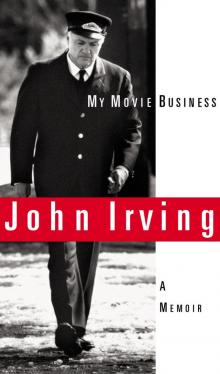 My Movie Business: A Memoir
My Movie Business: A Memoir In One Person
In One Person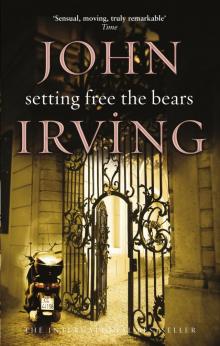 Setting Free the Bears
Setting Free the Bears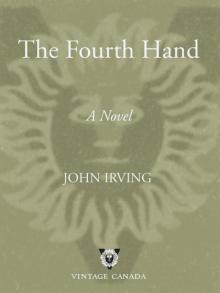 The Fourth Hand
The Fourth Hand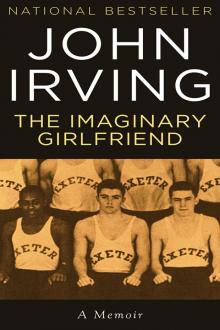 The Imaginary Girlfriend
The Imaginary Girlfriend A Prayer for Owen Meany
A Prayer for Owen Meany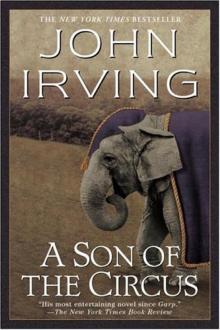 A Son of the Circus
A Son of the Circus Last Night in Twisted River
Last Night in Twisted River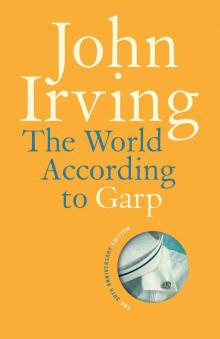 The World According to Garp
The World According to Garp The Cider House Rules
The Cider House Rules The Hotel New Hampshire
The Hotel New Hampshire The 158-Pound Marriage
The 158-Pound Marriage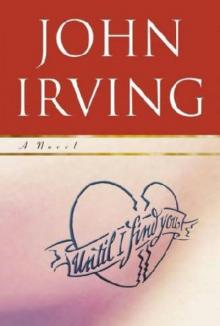 Until I Find You
Until I Find You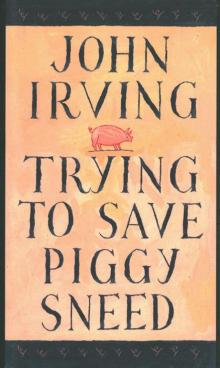 Trying to Save Piggy Sneed
Trying to Save Piggy Sneed Cider House Rules
Cider House Rules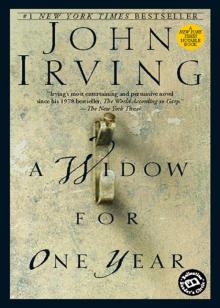 A Widow for One Year
A Widow for One Year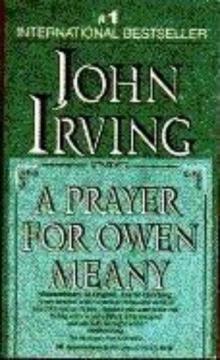 A prayer for Owen Meany: a novel
A prayer for Owen Meany: a novel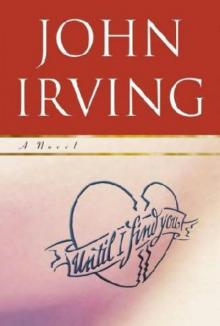 (2005) Until I Find You
(2005) Until I Find You